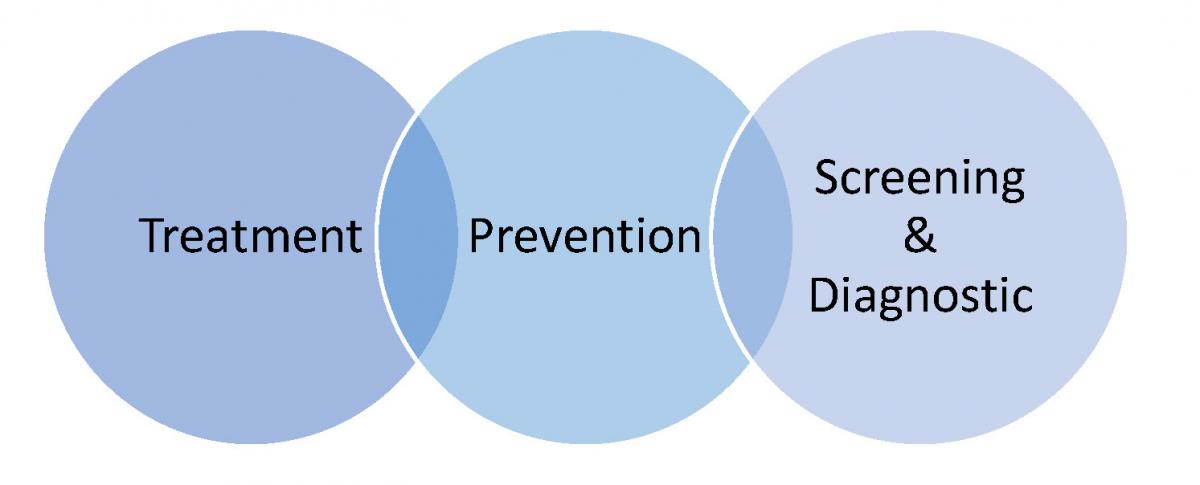 |
Who is the MTAA?
The Medical Technology Association of Australia (MTAA) is the peak association representing 70+ medical technology industry members from across the country. The MTAA aims to ensure the benefits of modern, innovative and reliable medical technology are delivered effectively to provide better health outcomes to the Australian community.
What are Clinical Trials?
In the context of medical devices, a clinical trial or a clinical investigation can be defined as any systematic investigation or study on one or more human subjects undertaken to assess the safety or performance of a medical device. [1]
Clinical trials for medical devices are predominantly conducted to identify the safety and performance of these devices in the treatment, prevention or diagnosis of disease:
 |
Why are Clinical Trials Important?
Clinical trials generate the evidence required for the Australian Government’s Health Technology Assessment (HTA) processes. Australian HTA processes include assessment by the Therapeutic Goods Administration to enable marketing of safe and effective medical devices in Australia and assessment by the Medical Services Advisory Committee and the Prostheses List Advisory Committee to enable clinically and cost-effective interventions and technologies to be funded.
Additionally, clinical trials reduce the overall budgetary burden on the healthcare system by providing access to often novel and groundbreaking treatments to Australian patients at the cost of the entity conducting the research. Recent research by Research Australia and Roy Morgan found that 56% of those surveyed indicated that they would definitely or probably participate in a clinical trial if it gave them free access to treatment that they could benefit from. [2]
Clinical trials also provide economic benefits that come with investment and job creation. A recent report [3] by the Australian Commission on Safety and Quality in Health Care and the Australian Clinical Trials Alliance found that for every dollar invested in clinical trials in Australia there was a return on investment of $5.80, and that there was a gross economic benefit of over $2billion measured through better health outcomes and reduced health service costs. [4]
What are the Types of Clinical Trials Involving Medical Devices?
The main types of clinical investigations for medical devices are outlined below: [5]
Type/Phase | Description |
Early feasibility study | This is a limited clinical investigation of a device early in development, typically before the device design has been finalised, for a specific use It is typically used to evaluate the device design with respect to clinical safety and device functionality in a small number of subjects (typically fewer than 10 subjects) when this information cannot practically be provided through other non-clinical means such as bench testing. Information obtained from an early feasibility study may guide device modifications. An early feasibility study does not necessarily involve the first clinical use of a device. |
First in human (FIH) study | This is a study in which a device for a specific indication is evaluated for the first time in human subjects. |
Traditional feasibility study | This is a clinical investigation that is commonly used to capture preliminary safety and effectiveness information on a near-final or final device design to adequately plan an appropriate pivotal study. Because the study of a near-final or final device design takes place later in development than an early feasibility study, regulators generally expect to see more nonclinical (or prior clinical) data in a traditional feasibility study Investigational Device Exemption (IDE) application. |
Pivotal study | This is a clinical investigation designed to collect definitive evidence of the safety and effectiveness of a device for a specified intended use, typically in a statistically justified number of subjects. It may or may not be preceded by an early and/or a traditional feasibility study. |
Post-market study | This is a clinical investigation conducted after the regulator has approved a product for marketing. This is commonly used for further identifying trends in device outcomes, design, usage, and associated problems. |
For Companies and Organisations
Further information on how to become involved in clinical trials in Australia can be found from the following websites:
MTPConnect
MedTech and Pharma industry growth center that provides information on, and seeks to accelerate the growth of the medical technologies, biotechnologies and the pharmaceuticals sector in Australia.
Therapeutic Goods Administration
The Therapeutic Goods Administration (TGA) is the national regulator and provides guidance and approvals for conducting clinical trials in Australia.
National Health & Medical Research Council
The National Health & Medical Research Council (NHMRC) is Australia’s leading expert body promoting the development and maintenance of public and individual health standards.
Australian Clinical Trials Toolkit
This Toolkit is a joint initiative of the NHMRC and Department of Industry, contains useful information on conducting a clinical trial in Australia.
For Individuals
Australian Clinical Trials (Official)
australianclinicaltrials.gov.au is a new initiative of the Australian Government seeking to promote organisation and awareness of clinical trials and information about current trials and research.
Consumers Health Forum
Consumer Guide to Clinical Trials
Outlines the benefits, considerations and seeks to answer questions which consumers and patients may have when deciding to participate in a clinical trial.
ClinTrial Refer (App)
ClinTrial Refer is a newly-created app seeking to increase accessibility for patients to clinical trials. The app is spearheaded by clinicians and medical professionals from NSW.
[1] Therapeutic Goods Administration, ‘Clinical Evidence Guidelines: Medical devices’ 24 February 2017; ISO 14155:2011 Clinical investigation of medical devices for human subjects – Good clinical practice (2011).
[2] Research Australia and Roy Morgan, ‘Australia Speaks - Research Australia Polling 2017’ (2017) at 15.
[3] Australian Commission on Safety and Quality in Healthcare and the Australian Clinical Trials Alliance, ‘Economic evaluation of investigator-initiated clinical trials conducted by networks’ (July, 2017).
[4] Ibid at 9.
[5] Investigational Device Exemptions (IDEs) for Early Feasibility Medical Device Clinical Studies, Including Certain First in Human (FIH) Studies. 1st October 2013